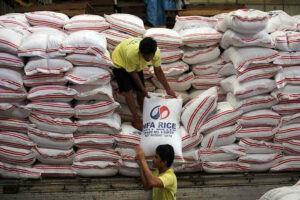PRESIDENT Ferdinand R. Marcos, Jr. expressed support for a bill that would amend the Rice Tariffication Act of 2019 to restore the National Food Authority’s (NFA) power to stockpile rice and intervene in the market if needed.
Mr. Marcos said he would certify as urgent a proposed amendment to the Rice Tariffication Act, citing the need for government involvement in the market to check rising rice prices.
“The problem is, rice prices are rising because traders are competing with each other. Their bidding for palay (unmilled rice) is pushing up prices, and we have no control over this,” he told reporters on the sidelines of an event in Manila.
By amending the charter of the National Food Authority and the 2019 law, the government can influence the farmgate price of palay, and ultimately retail prices, he added.
Speaker Martin G. Romualdez last week said the House is targeting a reduction in rice prices of as much as P10 to P15 per kilo with an amendment that restores the NFA’s power to buy rice and sell it at a lower price — effectively committing the NFA to sell subsidized rice.
Under the Constitution, a President can only certify a bill as urgent if there is a public emergency or calamity that requires the immediate passage of a law.
Inflation accelerated for a second straight month in March — to 3.7% from 3.4% in February — as rice prices continued to surge, according to the Philippine Statistics Authority. Rice inflation hit 24.4% in March, the strongest reading since the 24.6% posted in February 2009.
The government and private economists expect El Niño, which has caused P5.9 billion in agricultural damage as of April 30, to worsen inflation and push food prices even higher.
Agriculture Assistant Secretary Arnel de Mesa on Sunday expressed support for the House proposal, citing the lack of tools at the government’s disposal to respond to high rice prices.
The price of regular-milled rice was P50 per kilo, while that of domestically grown well-milled rice was P48 to P55. Imported rice fetched P51 to P54 per kilo.
Mr. De Mesa said that should such a bill be signed into law, the NFA needs to be cautious about selling rice at low prices as it may once again incur losses, which prompted the passage of the Rice Tariffication Law in the first place.
“This view of the President reflects a complete lack of understanding of the competition and the Rice Tariffication Law,” said Leonardo A. Lanzona, who teaches economics at the Ateneo de Manila.
It is unlikely for rice traders to raise prices because that will mean losing their consumers, he said via chat. “Collusion in the form of cartels and monopolies is the only way that the traders can unilaterally increase prices.”
“In which case, the solution is institutional in nature, not the government regulating prices,” he added, noting that the government should instead empower more traders to compete with alleged carters.
“Thus, the answer is really in strengthening the law, not amending it to allow for more government intervention,” Mr. Lanzona said. “Whatever the government can do will fail in comparison to what the markets can do.”
Reviewing the tariffication law for possible amendment was among the campaign promises of Mr. Marcos.
The 2019 law allowed private traders to bring in rice shipments without restriction, though they had to pay a 35% tariff on Southeast Asian grain, thereby generating revenue for the government instead of obligating the government to pay for rice imports in government-to-government deals with the source countries. The rules have since been modified to apply the 35% tariff to rice privately imported from any source country.
“I don’t think it is the role of the government to bring down palay prices just so that the government can buy enough palay for its buffer stocks. That would be unfair to farmers,” Raul Montemayor, national director of the Federation of Free Farmers, said in a Viber message.
He said the 2019 law should be amended to instead give the government other options to obtain rice to hold in reserve, including buying from importers, or even directly importing as a last resort.
“With respect to consumers, the cost of selling subsidized rice should be carefully studied, together with the manner of distribution to make sure only intended beneficiaries benefit and there are no leakages to middlemen,” he said.
“Overall, government intervention in both the palay and rice markets should be limited to extreme situations,” Mr. Montemayor noted, “and for as long as prices fall within a certain target range, the government must allow the private sector to operate without too much intervention.”
The Philippines imported 3.58 million metric tons (MT) of rice in 2023, according to the Bureau of Plant Industry.
In the same year, farmers produced 20 million MT of palay.
Jayson H. Cainglet, executive director of Samahang Industriya ng Agrikultura, said in a Viber message: “We’d rather that (the NFA’s function) be limited to buffer stocking, procuring palay directly from farmers.”
Mr. Cainglet, who was present at a House hearing on the bill on Monday, said his group is lobbying for a P20-billion increase in the annual P10-billion allotment for the Rice Competitiveness Enhancement Fund or Rice Fund. — Kyle Aristophere T. Atienza
